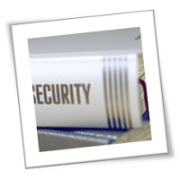NATIONAL COMPUTER SECURITY DAY
November 30th — is National Computer Security Day, an annual event observed since 1988 to help raise awareness worldwide of computer-related security issues. It should also serve as a reminder to small business owners to protect their computer networks from hackers, fraudsters and identity thieves.
Computer security is sometimes referred to as cybersecurity or IT (information technology) security. It applies to the protection of computer-based equipment, the information stored on and services related to it from unauthorized and unintended access, change or destruction, including unplanned events and natural disasters.
Recently, the public opinion research company Ipsos Reid released the findings of a survey of U.S. small businesses revealing that many of them do not fully comprehend the impact a data breach can have on them. As a result, they take a passive approach to safeguarding sensitive information that leaves them vulnerable not only to a breach but potentially devastating financial and reputational damage as well.
The survey also found that:
- Sixty-nine percent of small business owners are not aware or don’t believe that lost or stolen data would result in financial impact and harm to their businesses credibility.
- Forty percent have no protocols in place for securing data.
More than one-third of the respondents report that they never train staff on information security procedures. - Forty-eight percent have no one directly responsible for management of data security.
- Just 18 percent would encourage new data privacy legislation requiring stricter compliance and penalties to information security threats.
Computer Security Day is an excellent time to ensure that your company is following best practices to protect yourself from data breach and identity theft. They include:
- Analyzing possible security gaps in your organization and within your supply chain.
- Implementing ongoing risk analysis processes and creating a security policy specifically designed to limit exposure to fraud and data breaches.
- Regularly training employees in proper document management and encouraging their adoption of security best practices.
- Implementing a “shred-all” policy for unneeded documents and keeping sensitive materials under lock and key until they are destroyed.
- Paying particular attention to hard drives on computers or photocopiers. The only way to destroy data stored on hard drives is physical destruction.
- Installing and using effective computer network protection such as anti-virus software and a firewall.
To learn more about how to safeguard your business, or if you are looking for an expert to help you find the best solutions for your business talk to GCInfotech about a free technology assessment.












